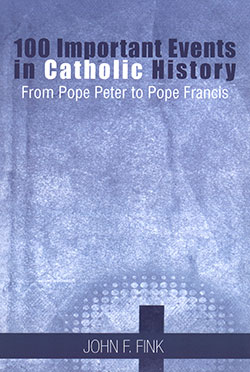Church’s 100 important events? Editor emeritus offers his list
Reviewed by Mike Krokos
 It begins with the Apostle Peter’s arrival in Rome, and ends with the election of Karol Josef Wojtyla, who took the name John Paul II, as pope.
It begins with the Apostle Peter’s arrival in Rome, and ends with the election of Karol Josef Wojtyla, who took the name John Paul II, as pope.
But in between, it includes 98 other events that author John F. Fink considers paramount in the history of our Church.
In 100 Important Events in Catholic History: From Pope Peter to Pope Francis, Fink—editor emeritus of The Criterion—lays out what he believes are very noteworthy occurrences in the life of our faith. The events are listed in chronological order because, as the author says, “it would be impossible to try to rank them in order of importance over the period of twenty centuries. Trying to do that would certainly provoke argument.”
The list begins with events that occurred after those recorded in the New Testament, Fink notes. “If I didn’t do that, I would have written a book about 100 important events in the New Testament. I would have had to include the birth of Christ, his teachings, miracles, crucifixion and resurrection, Saint Paul’s conversion and his missionary journeys, etc.”
In a postscript, the author also includes 50 other important events in the history of the Church that didn’t make his final cut.
Published by Xlibris, the book contains many chapters that have appeared in Fink’s weekly column in The Criterion through the years. Some of the material was also published in his book, Moments in Catholic History, which is now out of print.
From the “Publication of the Didache” to “Pope Paul VI Issues Humanae Vitae,” from “Augustine is Baptized” to the “Second Vatican Council Begins,” the 100 short chapters are two pages each and easy to comprehend, digest and reflect upon.
They share details of critical moments in the Church that many of us may have forgotten or never known.
How many of us remember or knew that Athanasius, a great defender of orthodoxy against the Arians, was the first to give approval to the canon of the New Testament as we know it today?
We know St. Augustine is considered to be the greatest of the Fathers and Doctors of the Church, but did we realize he is quoted far more often than any other ecclesiastical writer in the Catechism of the Catholic Church? For the record, he is quoted 84 times, while runner-up St. Thomas Aquinas is quoted 58 times in the catechism.
Those statistics are among the faith-filled nuggets the author shares in his latest work.
Chapters on St. Benedict, St. Boniface and St. Patrick and their contributions to the Church also fill the book, and so do the approval given to St. Francis of Assisi to found the Franciscan order (Order of Friars Minor), the Fourth Lateran Council defining transubstantiation, and Christopher Columbus’s discovery of America, which began an era of missionary work in the New World. The list of historical facts of faith goes on and on.
As Fink notes, 21 of his compilation of 100 events occurred after the 16th century, and another 13 occurred during the 16th century (the most in any century). The author includes events from every century, although there is only one from the seventh century.
Though the final chapter highlights the election of Pope John Paul II as universal shepherd of the Church, Fink also notes the election of Pope Benedict XVI after his death. He also mentions in this chapter Pope Benedict’s resignation in 2013, and the election of Pope Francis, the first pope with this name and the first person from the Americas (Argentina) elected pope.
“There is every reason to believe that someday the election of Pope Francis will be on someone’s list of 100 important events in Catholic history,” Fink writes.
We agree, but what Fink has compiled in his latest book offers a very good start to any discussion about the history of our faith.
(Mike Krokos is editor of The Criterion, newspaper of the Archdiocese of Indianapolis. To order 100 Important Events in Catholic History: From Pope Peter to Pope Francis, contact Xlibris Corp. by phone at 1-888-795-4274 or visit the website www.Xlibris.com. The book is also available from Amazon and Barnes and Noble. Amazon is selling the printed paperback for $19.79 and a Kindle edition for $3.99. Barnes and Noble’s price for the printed paperback is $20.05. Its Nook Book edition is $3.49.) †
